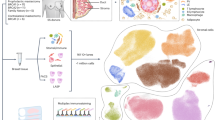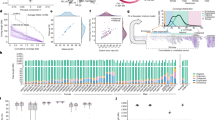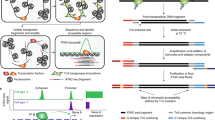Abstract
Gastric cancer is a major cause of global cancer mortality. We surveyed the spectrum of somatic alterations in gastric cancer by sequencing the exomes of 15 gastric adenocarcinomas and their matched normal DNAs. Frequently mutated genes in the adenocarcinomas included TP53 (11/15 tumors), PIK3CA (3/15) and ARID1A (3/15). Cell adhesion was the most enriched biological pathway among the frequently mutated genes. A prevalence screening confirmed mutations in FAT4, a cadherin family gene, in 5% of gastric cancers (6/110) and FAT4 genomic deletions in 4% (3/83) of gastric tumors. Frequent mutations in chromatin remodeling genes (ARID1A, MLL3 and MLL) also occurred in 47% of the gastric cancers. We detected ARID1A mutations in 8% of tumors (9/110), which were associated with concurrent PIK3CA mutations and microsatellite instability. In functional assays, we observed both FAT4 and ARID1A to exert tumor-suppressor activity. Somatic inactivation of FAT4 and ARID1A may thus be key tumorigenic events in a subset of gastric cancers.
This is a preview of subscription content, access via your institution
Access options
Subscribe to this journal
Receive 12 print issues and online access
$209.00 per year
only $17.42 per issue
Buy this article
- Purchase on Springer Link
- Instant access to full article PDF
Prices may be subject to local taxes which are calculated during checkout



Similar content being viewed by others
References
Li, M. et al. Inactivating mutations of the chromatin remodeling gene ARID2 in hepatocellular carcinoma. Nat. Genet. 43, 828–829 (2011).
Jones, S. et al. Core signaling pathways in human pancreatic cancers revealed by global genomic analyses. Science 321, 1801–1806 (2008).
Parsons, D.W. et al. The genetic landscape of the childhood cancer medulloblastoma. Science 331, 435–439 (2011).
Pleasance, E.D. et al. A small-cell lung cancer genome with complex signatures of tobacco exposure. Nature 463, 184–190 (2010).
Katoh, M. Dysregulation of stem cell signaling network due to germline mutation, SNP, Helicobacter pylori infection, epigenetic change and genetic alteration in gastric cancer. Cancer Biol. Ther. 6, 832–839 (2007).
Panani, A.D. Cytogenetic and molecular aspects of gastric cancer: clinical implications. Cancer Lett. 266, 99–115 (2008).
Greenman, C. et al. Patterns of somatic mutation in human cancer genomes. Nature 446, 153–158 (2007).
Huang, W., Sherman, B.T. & Lempicki, R.A. Systematic and integrative analysis of large gene lists using DAVID Bioinformatics Resources. Nat. Protoc. 4, 44–57 (2009).
Sjöblom, T. et al. The consensus coding sequences of human breast and colorectal cancers. Science 314, 268–274 (2006).
Compton, A.G. et al. Mutations in contactin-1, a neural adhesion and neuromuscular junction protein, cause a familial form of lethal congenital myopathy. Am. J. Hum. Genet. 83, 714–724 (2008).
Su, J.L. et al. Knockdown of contactin-1 expression suppresses invasion and metastasis of lung adenocarcinoma. Cancer Res. 66, 2553–2561 (2006).
Berx, G. & van Roy, F. Involvement of members of the cadherin superfamily in cancer. Cold Spring Harb. Perspect. Biol. 1, a003129 (2009).
Wang, Y. Wnt/Planar cell polarity signaling: a new paradigm for cancer. Mol. Cancer Ther. 8, 2103–2109 (2009).
Saburi, S. et al. Loss of Fat4 disrupts PCP signaling and oriented cell division and leads to cystic kidney disease. Nat. Genet. 40, 1010–1015 (2008).
Mao, Y. et al. Characterization of a Dchs1 mutant mouse reveals requirements for Dchs1-Fat4 signaling during mammalian development. Development 138, 947–957 (2011).
Mahoney, P.A. et al. The fat tumor suppressor gene in Drosophila encodes a novel member of the cadherin gene superfamily. Cell 67, 853–868 (1991).
Qi, C., Zhu, Y.T., Hu, L. & Zhu, Y.J. Identification of Fat4 as a candidate tumor suppressor gene in breast cancers. Int. J. Cancer 124, 793–798 (2009).
Ramensky, V. et al. Human non-synonymous SNPs: server and survey. Nucleic Acids Res. 30, 3894–3900 (2002).
Agrawal, N. et al. Exome sequencing of head and neck squamous cell carcinoma reveals inactivating mutations in NOTCH1. Science 333, 1154–1157 (2011).
Deng, N. et al. A comprehensive survey of genomic alterations in gastric cancer reveals systematic patterns of molecular exclusivity and co-occurrence among distinct therapeutic targets. Gut published online, doi:0.1136/gutjnl-2011-301839 (7 February 2012).
Van Loo, P. et al. Allele-specific copy number analysis of tumors. Proc. Natl. Acad. Sci. USA 107, 16910–16915 (2010).
Cuadrado, M., Sacristán, M. & Antequera, F. Species-specific organization of CpG island promoters at mammalian homologous genes. EMBO Rep. 2, 586–592 (2001).
Cavallaro, U. & Christofori, G. Cell adhesion and signalling by cadherins and Ig-CAMs in cancer. Nat. Rev. Cancer 4, 118–132 (2004).
Yachida, S. et al. Distant metastasis occurs late during the genetic evolution of pancreatic cancer. Nature 467, 1114–1117 (2010).
Wiegand, K.C. et al. Loss of BAF250a (ARID1A) is frequent in high-grade endometrial carcinomas. J. Pathol. 224, 328–333 (2011).
Wang, K. et al. Exome sequencing identifies frequent mutation of ARID1A in molecular subtypes of gastric cancer. Nat. Genet. 43, 1219–1223 (2011).
Jones, S. et al. Frequent mutations of chromatin remodeling gene ARID1A in ovarian clear cell carcinoma. Science 330, 228–231 (2010).
Wiegand, K.C. et al. ARID1A mutations in endometriosis-associated ovarian carcinomas. N. Engl. J. Med. 363, 1532–1543 (2010).
Van Rechem, C., Boulay, G. & Leprince, D. HIC1 interacts with a specific subunit of SWI/SNF complexes, ARID1A/BAF250A. Biochem. Biophys. Res. Commun. 385, 586–590 (2009).
Gao, X. et al. ES cell pluripotency and germ-layer formation require the SWI/SNF chromatin remodeling component BAF250a. Proc. Natl. Acad. Sci. USA 105, 6656–6661 (2008).
Guan, B., Wang, T.L. & Shih, IeM. ARID1A, a factor that promotes formation of SWI/SNF-mediated chromatin remodeling, is a tumor suppressor in gynecologic cancers. Cancer Res. 71, 6718–6727 (2011).
Neuhaus, E.M. et al. Activation of an olfactory receptor inhibits proliferation of prostate cancer cells. J. Biol. Chem. 284, 16218–16225 (2009).
Spicer, Z. et al. Stomachs of mice lacking the gastric H,K-ATPase α-subunit have achlorhydria, abnormal parietal cells, and ciliated metaplasia. J. Biol. Chem. 275, 21555–21565 (2000).
Fuereder, T. et al. Gastric cancer growth control by BEZ235 in vivo does not correlate with PI3K/mTOR target inhibition but with [18F]FLT uptake. Clin. Cancer Res. 17, 5322–5332 (2011).
Li, H. & Durbin, R. Fast and accurate short read alignment with Burrows-Wheeler transform. Bioinformatics 25, 1754–1760 (2009).
Li, H. et al. The Sequence Alignment/Map format and SAMtools. Bioinformatics 25, 2078–2079 (2009).
McKenna, A. et al. The Genome Analysis Toolkit: a MapReduce framework for analyzing next-generation DNA sequencing data. Genome Res. 20, 1297–1303 (2010).
Cancer Genome Atlas Research Network. Integrated genomic analyses of ovarian carcinoma. Nature 474, 609–615 (2011).
Olshen, A.B. et al. Circular binary segmentation for the analysis of array-based DNA copy number data. Biostatistics 5, 557–572 (2004).
Ooi, C.H. et al. Oncogenic pathway combinations predict clinical prognosis in gastric cancer. PLoS Genet. 5, e1000676 (2009).
Acknowledgements
We thank S.T. Tay, K. Ramnarayanan, A. Pandey, Z. Lei, Y. Liu, Y. Suzuki, S. Ramgopal and the Duke–NUS Genome Biology Facility for technical assistance. We also thank AITbiotech for sequencing services. N.D., I.B.T. and W.Y. are recipients of the NUS Graduate School for Integrative Sciences and Engineering Scholarship. This work was supported by funding from the National Medical Research Council (NMRC/ TCR/001/2007 and NMRC/STAR/0006/2009), the Cancer Science Institute of Singapore, the Genome Institute of Singapore, Duke–NUS Graduate Medical School Singapore and The Lee Foundation.
Author information
Authors and Affiliations
Contributions
P.T., B.T.T. and S.R. conceived of and designed the study. Z.J.Z. and P.T. directed the study. I.C., J.R.M., N.D., W.Y., Y.W., S.R., D.B. and Z.J.Z. performed the bioinformatics data analysis. S.L.P., S.L.Z., J.T., V.R., H.L.H., A.G., K.H.L., C.K.O., D.H., S.Y.C., C.C.Y.N., M.L., J.W. and D.P. performed experiments, including the sequencing and functional study. I.B.T., W.K. Wan, S.Y.R., J.S., M.S.-T., K.G.Y., W.K. Wong, Y.-J.Z., P.A.F., B.P., Y.R., A.M.H., N.N., B.T.T. and S.R. contributed samples, reagents, data and comments on the manuscript. Z.J.Z. and P.T. analyzed and interpreted data and wrote the manuscript with the assistance and final approval from all authors.
Corresponding authors
Ethics declarations
Competing interests
The authors declare no competing financial interests.
Supplementary information
Supplementary Text and Figures
Supplementary Figures 1–10, Supplementary Tables 1, 2, 4–16 and Supplementary Note. (PDF 1658 kb)
Supplementary Table 3
Non-synonymous somatic point mutations affecting exons or splice sites in 15 gastric adenocarcinomas. (XLSX 63 kb)
Rights and permissions
About this article
Cite this article
Zang, Z., Cutcutache, I., Poon, S. et al. Exome sequencing of gastric adenocarcinoma identifies recurrent somatic mutations in cell adhesion and chromatin remodeling genes. Nat Genet 44, 570–574 (2012). https://doi.org/10.1038/ng.2246
Received:
Accepted:
Published:
Issue Date:
DOI: https://doi.org/10.1038/ng.2246
This article is cited by
-
The effects of ARID1A mutation in gastric cancer and its significance for treatment
Cancer Cell International (2023)
-
Coexistent ARID1A-PIK3CA mutations are associated with immune-related pathways in luminal breast cancer
Scientific Reports (2023)
-
Chromatin and noncoding RNA-mediated mechanisms of gastric tumorigenesis
Experimental & Molecular Medicine (2023)
-
Abnormal chromatin remodeling caused by ARID1A deletion leads to malformation of the dentate gyrus
Cell Death & Differentiation (2023)
-
Signaling pathways and therapeutic interventions in gastric cancer
Signal Transduction and Targeted Therapy (2022)



